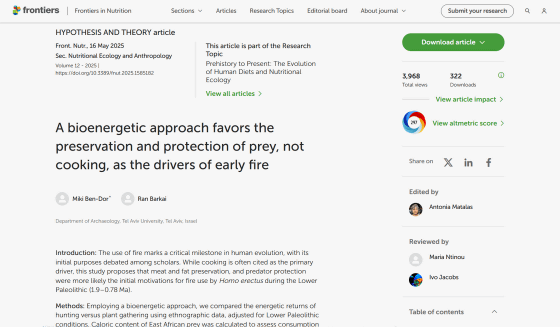Humans may have been using fire to smoke meat for about 2 million years

Frontiers | A bioenergetic approach favors the preservation and protection of prey, not cooking, as the drivers of early fire
https://www.frontiersin.org/journals/nutrition/articles/10.3389/fnut.2025.1585182/full

Stone Age BBQ: How Early Humans Preserved Meat with Fire | Tel Aviv University | Tel Aviv University
https://english.tau.ac.il/research/smoked-food-prehistoric
Humans Have Smoked Meat For Almost 2 Million Years, Study Suggests : ScienceAlert
https://www.sciencealert.com/humans-have-smoked-meat-for-almost-2-million-years-study-suggests
The rise of humanity and the use of fire are closely linked, but it takes a lot of effort and time to make a fire and keep it going, so prehistoric researchers are asking the question, 'Why did early humans start using fire?'
Now, a research team led by Dr. Miki Ben Dor and Professor Ran Barkai of the Department of Archaeology and Ancient Near Eastern Cultures at Tel Aviv University in Israel has used a bioenergetic approach to analyze early humans' use of fire.
'The origins of fire use are a burning topic for prehistorians around the world. There is general agreement that fire became common in households by 400,000 years ago, probably for roasting meat and for lighting and heating. But there is debate about the previous million years, and many different hypotheses have been put forward to explain why early humans started using fire. In this study, we sought to find a new perspective on this issue,' said Barkai.
Although most archaeological sites older than 400,000 years have no evidence of fire, some sites have clear evidence of fire. It is believed that early humans, including Homo erectus , did not use fire on a daily basis, but only occasionally for special purposes.
Mr. Barkai holding an elephant bone

by Tel Aviv University
The team looked at literature for archaeological sites dating back between 1.8 million and 800,000 years ago that show evidence of fire, finding nine sites around the world that fit the criteria: two in Israel, six in Africa, and one in Spain.
After examining commonalities among the sites, the researchers found that all of the sites contained large amounts of bones from large animals, such as elephants, hippos, and rhinos. These animals were known to have played an important role in the diet of early humans, providing most of the calories they needed. For example, the calories in the meat and fat of a single elephant would provide more than the calories needed by a group of 20 to 30 people for a month.
However, the research team's analysis showed that if the hunted meat was grilled and eaten immediately, the energy balance was lower than if the hunted meat was foraged. On the other hand, if the hunted meat was preserved by smoking or other methods, the energy balance improved dramatically.
Combining these factors, the research team proposed the hypothesis that 'the motivation for early humans to start using fire was to protect prey from other predators that targeted meat, while at the same time preserving meat by smoking and drying it so that it could be eaten for a long time.'
Pictured below are some of the burnt bones analyzed in this study.

by Tel Aviv University
'Gathering fuel, starting a fire and maintaining it for a long time is a labor-intensive process, so we needed a compelling, energy-efficient motivation,' says Ben-Dor. 'The elephants and hippos they hunted were a real treasure trove, a storehouse of meat and fat that had to be protected and preserved over many days because it was targeted not only by predators but also by bacteria.'
'This study offers a new interpretation of what motivated early humans to start using fire: the need to protect large hunted animals from other predators and the need to preserve large amounts of meat for a long time,' said Barkai. 'Once fire was lit for these purposes, it was likely used occasionally for cooking as well, without any additional energy costs.'
Related Posts:







